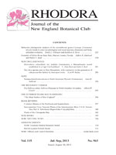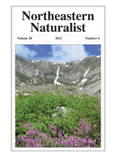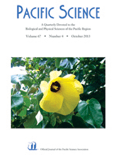
PROCEEDINGS OF THE LINNEAN SOCIETY OF NEW SOUTH WALES
Scope & Guideline
Exploring Australia's Rich Biodiversity and Ecological Insights
Introduction
Aims and Scopes
- Paleontological Research:
The journal frequently publishes studies on fossils and ancient life, focusing particularly on Australian geological formations. This includes the description of new species and the exploration of evolutionary history. - Ecological and Environmental Studies:
Research on vegetation patterns, fire ecology, and the impact of climate change on ecosystems is a core focus, reflecting the journal's commitment to understanding and preserving biodiversity. - Biogeography and Plant Studies:
Many articles investigate plant biogeography and ecology, contributing to knowledge about flora distribution and the factors that influence plant communities in New South Wales and beyond. - Cultural and Historical Perspectives:
The inclusion of studies that examine the intersection of natural history with cultural and historical narratives enriches the journal’s scope, providing context for environmental changes and human impact. - Conservation and Management:
The journal addresses issues related to conservation strategies and the management of natural resources, highlighting the importance of sustainable practices in preserving biodiversity.
Trending and Emerging
- Impact of Climate Change on Ecosystems:
Recent studies increasingly focus on the effects of climate change, particularly in relation to fire ecology and vegetation patterns, underscoring the urgency of understanding these impacts on local biodiversity. - Fungal Diversity and Ecology:
Research on fungi, particularly club and coral fungi, is emerging as a significant theme, highlighting the ecological roles these organisms play and their responses to environmental changes. - Fire Ecology and Resilience Studies:
The increasing focus on the impact of bushfires, particularly following the 2019-20 mega-fires, indicates a growing interest in understanding fire dynamics and resilience in Australian ecosystems. - Interdisciplinary Approaches to Natural History:
There is a trend towards integrating various disciplines, such as combining ecology with geomorphology and climate studies, to provide a more holistic understanding of environmental changes. - Endemic Species and Conservation Strategies:
Research on endemic species, especially in response to environmental changes, is gaining traction, reflecting a broader concern for conservation and the need to develop effective management strategies.
Declining or Waning
- Historical Biological Studies:
Research focused on historical biological figures or events, such as the detailed reports on past expeditions or historical departmental studies, has seen a decline, possibly as the field shifts towards more contemporary ecological issues. - In-depth Taxonomic Studies of Lesser-known Species:
Although taxonomic studies remain important, there seems to be a waning interest in the extensive taxonomy of less prominent species, as the journal increasingly prioritizes ecological and conservation-related articles. - Reports on Non-native Species:
There has been a noticeable reduction in publications addressing non-native species and their impacts, which may indicate a shift towards a more localized focus on native species and ecosystems.
Similar Journals

PRESLIA
Advancing Botanical Knowledge Since 1979PRESLIA, published by the Czech Botanical Society, is an esteemed academic journal that has been contributing to the fields of Ecology and Plant Science since its inception in 1979. With an impressive Q1 ranking in both categories for 2023, it stands out among its peers as a vital resource for researchers, professionals, and students alike. The journal is dedicated to disseminating high-quality research that advances our understanding of botanical sciences, encompassing a diverse array of topics from plant ecology to conservation strategies. With a ranking of #110 out of 516 in Plant Science and #103 out of 461 in Ecology on Scopus, PRESLIA consistently maintains a high impact, reflecting its crucial role in shaping contemporary scientific discourse. While traditional access options are available, the journal's commitment to fostering academic collaboration makes it a key player in the global scientific community. Located in Prague, Czech Republic, PRESLIA continues to bridge gaps in research and offers a platform for innovative scholarly communication up until 2024 and beyond.

Mediterranean Botany
Exploring the Richness of Mediterranean FloraMediterranean Botany is a distinguished peer-reviewed journal dedicated to the flourishing fields of Ecology, Plant Science, and Ecology, Evolution, Behavior and Systematics. Published by the Universidad Complutense de Madrid, Servicio Publicaciones, this Open Access journal has been disseminating valuable research since 2018, ensuring that findings are accessible to a global audience, with an emphasis on Mediterranean vegetation and biodiversity. With an ISSN of 2603-9109, it contributes significantly to the academic discourse in its category quartiles, recently featuring in Q3 for Ecology and related fields. Notably, Mediterranean Botany ranks within the top half of its category in Scopus, highlighting its relevance and contribution to the scientific community. Researchers, professionals, and students alike will find the journal to be a vital resource for latest discoveries, trends, and conservation strategies in Mediterranean ecosystems, positioning it as an essential platform for advancing knowledge and fostering collaboration within the plant sciences.

RHODORA
Fostering Innovation in Plant EcologyRHODORA, published by the New England Botanical Club Inc, is a prominent journal dedicated to the field of botany, specifically focusing on Horticulture and Plant Science. With a rich history dating back to its founding years and ongoing publication from 1995 to 2024, this journal serves as a vital platform for disseminating research, reviews, and advancements in botanical studies. Though classified in the Q4 quartile for both horticulture and plant science in 2023, RHODORA remains an essential resource for researchers and practitioners, providing insights into plant ecology, conservation, and cultivation practices. While it does not offer Open Access options, the journal's commitment to quality research in a highly specialized field makes it a significant contributor to the botanical sciences, fostering collaboration and innovation among scholars and professionals in the United States and beyond.

Brazilian Journal of Botany
Advancing plant science through innovative research.The Brazilian Journal of Botany, published by SOC BOTANICA SAO PAULO, stands as a vital resource in the field of plant sciences, particularly noted for its contributions to agricultural and biological research. With an ISSN of 0100-8404 and an E-ISSN of 1806-9959, this journal has established a robust presence since its inception, continuing to foster growth in botanical research through its anticipated publications from 2006 to 2024. Ranking in the second quartile (Q2) in Plant Science and positioned at 207 out of 516 within Scopus rankings, the journal demonstrates both quality and relevance, occupying the 59th percentile in its category. As an essential platform for scholars, practitioners, and students alike, it disseminates original research, reviews, and advancements within plant biology, thereby promoting understanding and innovation in plant sciences. While the journal currently does not offer open access, its rich content remains pivotal for those invested in the intricacies of botanical science.

RECORDS OF THE AUSTRALIAN MUSEUM
Advancing Knowledge in Natural History and Cultural HeritageRecords of the Australian Museum is a leading journal in the fields of Animal Science, Ecology, History, and Museology, published by the renowned Australian Museum in Sydney, Australia. With a commitment to advancing knowledge and understanding of natural history and cultural heritage, this journal provides an essential platform for original research, reviews, and significant findings relevant to its diverse academic audience. The journal encompasses a broad scope, including studies in ecology, evolution, behavior, systematics, and the history of science, attracting contributions from leading scholars and professionals. Notably, it ranks highly in various categories, achieving a Q1 ranking in History and Museology, reflecting its impact and prestige within the academic community. Although it operates under a traditional access model, the journal ensures that its robust compilation of cutting-edge research remains vital to researchers, professionals, and students aiming to stay informed of the latest developments in their fields. With converging years of publication since 1983, Records of the Australian Museum continues to play a pivotal role in disseminating critical insights and fostering discussions that shape our understanding of both the natural world and our cultural heritage.

FOLIA GEOBOTANICA
Uncovering the past to illuminate the future of plant ecology.FOLIA GEOBOTANICA, published by Springer, is a distinguished journal dedicated to advancing the fields of Paleontology and Plant Science through the dissemination of high-quality research. With an ISSN of 1211-9520 and an E-ISSN of 1874-9348, this journal has been pivotal in providing a platform for innovative studies from 1994 to 2024. Notably, FOLIA GEOBOTANICA holds a Q3 ranking in Paleontology and a Q2 ranking in Plant Science as of 2023, affirming its relevance and contribution to the scholarly community. The journal is located in the Netherlands at VAN GODEWIJCKSTRAAT 30, 3311 GZ DORDRECHT, and is not an Open Access publication, ensuring comprehensive review processes and scholarly integrity. With Scopus rankings that place it in the 50th percentile for Plant Science and 46th for Paleontology, FOLIA GEOBOTANICA continues to attract researchers, professionals, and students who are keen to explore the intricacies of plant ecology and fossil records, thereby fostering a deeper understanding of ecological and evolutionary patterns.

NORDIC JOURNAL OF BOTANY
Unveiling Nature's Secrets through Rigorous InquiryNORDIC JOURNAL OF BOTANY, published by WILEY, is a distinguished journal that serves as a vital platform for the dissemination of innovative research in the fields of Plant Science and Ecology, Evolution, Behavior and Systematics. With an ISSN of 0107-055X and E-ISSN 1756-1051, this journal has been a crucial part of the academic landscape since its inception in 1981, continuing to contribute significantly to the literature up to 2024. NORDIC JOURNAL OF BOTANY holds a commendable Q2 ranking in Plant Science and Q3 in Ecology, which underscores its impact and relevance in the scientific community. Despite the absence of Open Access options, the journal offers robust access features that ensure researchers and readers can easily engage with its meticulously curated content. Aimed at both seasoned professionals and emerging scholars, the journal not only publishes high-quality articles but also fosters collaboration and knowledge exchange across various related disciplines, thereby solidifying its role as a cornerstone in botanical and ecological research.

NORTHEASTERN NATURALIST
Exploring the Rich Tapestry of Northeastern EcologyNORTHEASTERN NATURALIST is a prominent academic journal published by the Eagle Hill Institute, focusing on the intricate field of ecology, evolution, behavior, and systematics. With an ISSN of 1092-6194 and an E-ISSN of 1938-5307, this journal serves as a vital platform for researchers, professionals, and students who are keen on contributing to or expanding their knowledge of natural history in the Northeastern United States. Although currently not designated as Open Access, it maintains a significant academic influence, evidenced by its ranking as Q4 in the 2023 Ecology, Evolution, Behavior and Systematics category, and a Scopus rank of #586 out of 721 within its field, placing it in the 18th percentile. Spanning from 1999 to 2024, the journal aims to disseminate high-quality research that not only enhances scientific understanding but also promotes the conservation and sustainable use of biodiversity. Researchers are encouraged to submit their original studies, reviews, and methodologies that highlight ecological interactions and evolutionary processes, making NORTHEASTERN NATURALIST an essential resource for those dedicated to the science of life.

PACIFIC SCIENCE
Advancing Multidisciplinary Insights from the PacificPACIFIC SCIENCE is a prestigious multidisciplinary journal published by University of Hawaii Press, dedicated to advancing knowledge across diverse fields of study related to the Pacific region. With a robust ISSN of 0030-8870 and an E-ISSN of 1534-6188, this journal serves as a vital platform for researchers, professionals, and students to disseminate and access influential research findings that contribute to the understanding of ecological, cultural, and social dynamics in the Pacific. The journal has steadily maintained its relevance since its inception in 1947 and features a commendable Scopus Rank of #74 out of 171 in the multidisciplinarity category, placing it in the 57th percentile of its field, and is recognized as having a Q2 quartile ranking in 2023. Although lacking open access options, PACIFIC SCIENCE offers in-depth analysis and scholarly discourse, effectively bridging various disciplines to foster collaboration and innovation. With its commitment to high-quality research and its significant impact on Pacific studies, the journal continues to play an important role in informing policy, conservation efforts, and community engagement within this vital region.

Revista de Sociedad Gaditana de Historia Natural
Connecting Researchers and Nature Enthusiasts AlikeRevista de Sociedad Gaditana de Historia Natural, published by the SOC GADITANA HISTORIA NATURAL, stands as a pivotal journal in the realm of natural history and environmental sciences. With the ISSN 1577-2578 and E-ISSN 2340-5759, this publication seeks to advance the understanding of biodiversity and ecosystems, particularly within the biodiverse regions of Cádiz, Spain. The journal fosters an open dialogue among researchers, professionals, and students, providing a platform for the dissemination of empirical findings, reviews, and theoretical discussions related to natural history. Although it operates under a non-open-access model, it is anticipated that the journal will play a crucial role in enhancing environmental awareness and promoting conservation efforts through high-quality scholarly contributions. The importance of documenting and understanding the intricate relationships within our ecosystems cannot be overstated, making this journal a valuable resource for anyone passionate about the natural world.